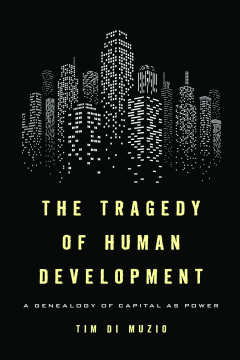
Additional Information
Book Details
Abstract
How might an objective observer conceive of what humans have accomplished as a species over its brief history? Benjamin argues that history can be judged as one giant catastrophe. Liberals suggest that this is to sombre an assessment and that human history can be read as a story of greater and greater progress in human rights, prosperity and the decrease of arbitrary and extra-judicial violence. But is there a third reading of history, one that neither interprets human history as a giant catastrophe or endless progress? Could we not say that human development has been a tragedy?
This book explores the idea of human development as a tragedy from the perspective of capitalist power. Although the argument of this book draws heavily on critical political economy, the analysis considers interdisciplinary literature in an effort to explore how major revolutions have transformed human social relations of power and created certain path dependencies that may ultimately lead to our downfall as a species. Intellectually sophisticated and readable, this book offers a provocative genealogy of capitalist power and the tragedy of human development.
Di Muzio offers an original analysis of how to understand and overcome the current crisis of social reproduction – the threats posed by environmental destruction and war to human civilization – the roots of which Di Muzio traces to the capitalist organization of society. This is perhaps the most pressing issue of our time and, as such, the book deserves a wide readership.
Damien Cahill, Associate Professor of Political Economy at the University of Sydney
In this sweeping and highly readable historical account, Tim Di Muzio traces the evolution of capital as power from its embryonic beginnings in the early civilizations of the Fertile Crescent to the hyper-capitalized world of the twenty-first century. A captivating must-read for anyone seeking to understand how the capitalist mode of power undermines humanity and threatens its future.
Jonathan Nitzan, co-author of Capital as Power: A Study of Order and Creorder
Di Muzio (Univ. of Wollongong, Australia) examines the history of human development in an attempt to understand how the world got to the point where “our main operating system is geared towards differential capitalization and the accumulation of social power rather than the enhancement of life and the protection of our environments that sustain it.” The latter he calls the “logic of livelihood,” and the former is the “logic of differential accumulation.” He attributes this to the power of capital and, in five "acts," he examines its history from early civilization through the present day. Act 1 looks at the agricultural revolution and the invention of money, the beginning of minority domination of the masses. Act 2 considers colonialism and the transatlantic slave trade, its contribution to increased inequality. Act 3 is the fossil fuel revolution. Act 4 examines the current system of corporate capitalism and its effects on labor and the natural environment. In Act 5, the author questions the conventional wisdom of economic growth, debt, and the global capitalist system. The book raises thought-provoking questions from start to finish.
Summing Up: Recommended. Upper-division undergraduates through faculty.
With The Tragedy of Human Development, Di Muzio pulls off an incredible feat. Combining an encyclopaedic sweep of human history with rigorous research and written in an engaging style, he provides a provocative and timely geneaology of our current predicament and how it can be understood as resulting from the enduring mode of power known as ‘capital as power’, manifest in trends towards monetization, commodification, exclusion and war.
Peter Newell, co-author of Climate Capitalism and author of Globalization & the Environment: Capitalism, Ecology and Power, Professor of International Relations, University of Sussex
Tim Di Muzio is a Senior Lecturer in International Relations and Global Political Economy in the School of Humanities and Social Inquiry at the University of Wollongong, Australia. He is author of Carbon Capitalism (Rowman & Littlefield International, 2015), The 1% and the Rest of Us (Zed, 2015), and with Richard H. Robbins, Debt as Power (2016) and An Anthropology of Money (2017).
With The Tragedy of Human Development, Di Muzio pulls off an incredible feat. Combining an encyclopaedic sweep of human history with rigorous research and written in an engaging style, he provides a provocative and timely geneaology of our current predicament and how it can be understood as resulting from the enduring mode of power known as ‘capital as power’, manifest in trends towards monetization, commodification, exclusion and war.
Peter Newell, co-author of Climate Capitalism and author of Globalization & the Environment: Capitalism, Ecology and Power, Professor of International Relations, University of Sussex
Table of Contents
| Section Title | Page | Action | Price |
|---|---|---|---|
| The Tragedy of Human Development | Cover | ||
| Contents | vii | ||
| Foreword | ix | ||
| Acknowledgments | xiii | ||
| Prologue | 1 | ||
| Mise-en-scène | 15 | ||
| Act I The First Power Civilizations | 31 | ||
| Act II Colonialism and the Transatlantic Slave Trade | 53 | ||
| Act III The Fossil Fuel Revolution | 91 | ||
| Act IV Corporate Capitalism | 119 | ||
| Act V Human Development | 145 | ||
| Epilogue | 161 | ||
| References | 163 | ||
| Index | 177 | ||
| About the Author | 185 |
